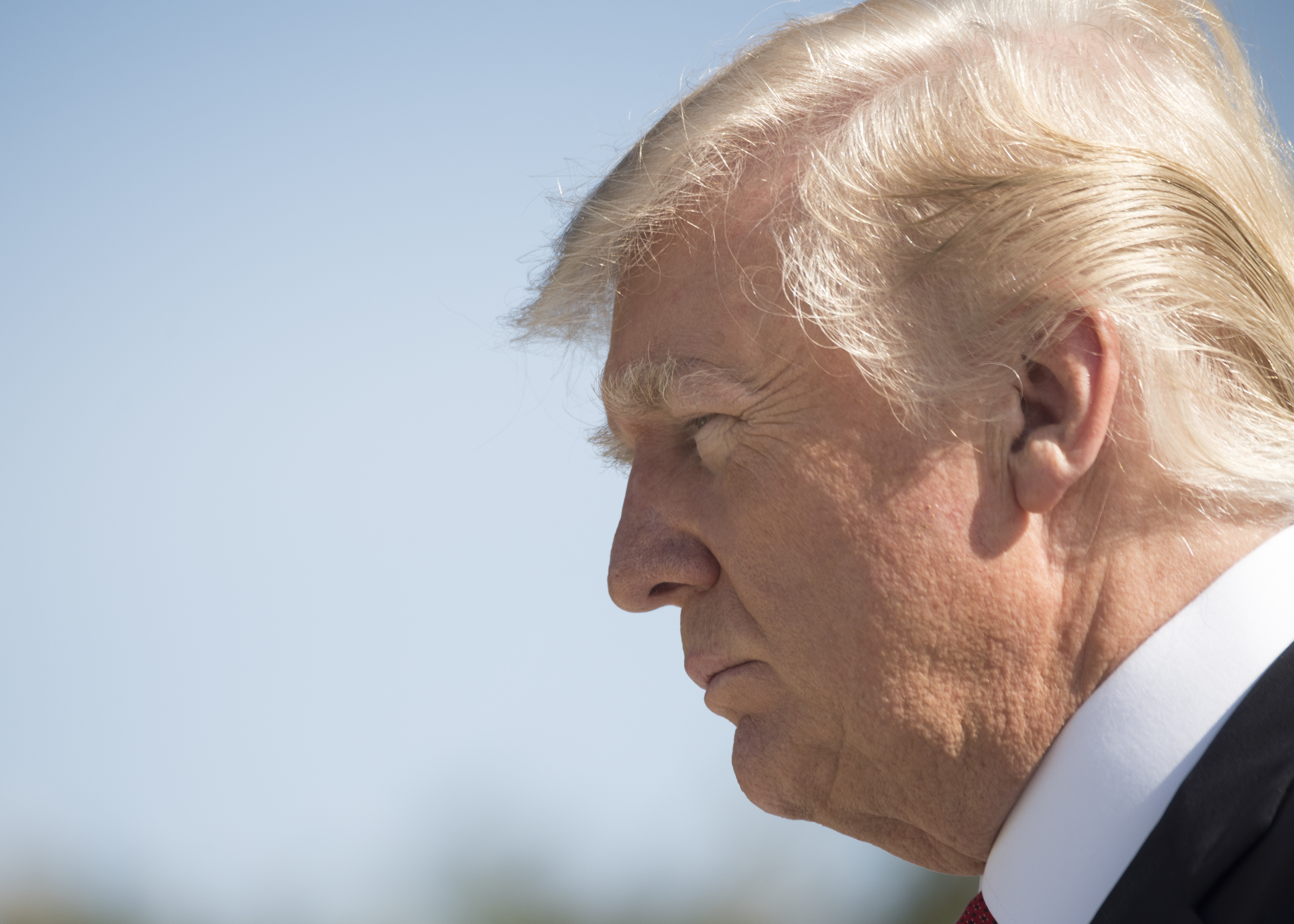On Wednesday, September 20, Hurricane Maria made direct landfall on Puerto Rico, hammering it with 150 mph winds, with parts of the island seeing 30 inches of rain. Electricity is still scarce. Almost half of its population—3.4 million people—remain without drinking water, making bottles and buckets essential to survival. Just 11 of the island’s 69 hospitals have power or fuel, and 85 percent of cell towers have been knocked out, crippling communication and complicating relief efforts. “Make no mistake,” Puerto Rico governor Ricardo Rosselló said in a statement. “This is a humanitarian disaster involving 3.4 million U.S. citizens.”
And yet President Trump—even by Trumpian standards—has been lackadaisical in his response. After days of tweeting obsessively about the NFL and ignoring Puerto Rico, he finally tweeted about the island—with what could be read as contempt. “Texas & Florida are doing great but Puerto Rico, which was already suffering from broken infrastructure & massive debt, is in deep trouble,” he tweeted on Monday. Then in remarks on Tuesday, things got even more surreally apathetic: “We’ve gotten A-pluses on Texas and on Florida, and we will also on Puerto Rico,” Trump said twice. “But the difference is, this is an island sitting in the middle of an ocean. And it’s a big ocean; it’s a very big ocean.”
Yes, the ocean is big. But the gap here is more psychological than geographic. Jay Van Bavel, a New York University psychologist who studies how people perceive people that they do and don’t identify with, tells Thrive Global that the island “is in Trump’s blindspot” because he might not consider them “Americans and therefore deserving of empathy (also the inhabitants of Puerto Rico are visual minorities).” But it’s not just Trump, he noted: almost half of Americans don’t realize that Puerto Ricans are citizens.
His frequent collaborator Mina Cikara, a psychologist at Harvard, said that Trump and Puerto Rico represents a “classic scenario” of an empathy blindspot. As her and Van Bavel’s work, as well as others’ research, is starting to show, people literally feel less for those who are “socially distant,” or belonging to a group they don’t identify with.
A formative 2010 Current Biology paper by a team of Italian researchers showed how this happens at a physical level. They recruited black and white participants and showed them videos of hands being poked with needles. When the video was of someone belonging to their same ethnic group getting prodded, then the muscle group on their own hand got fired up as if it were happening to them—called “ingroup-specific pain embodiment” in the paper. But there was no such reaction when watching a video of another ethnic group.
“It’s not like we feel something and then we have to inhibit it—there’s just not a response in the first place. There’s sort of an apathetic reaction rather than an empathetic reaction,” Cikara, who was not involved in the paper, tells Thrive Global. “This suggests that people just don’t marshal the same emotional responses to bear when they see the misfortunate people who are socially distant from themselves. To the extent that people don’t think of Puerto Ricans Americans, you may not have the same empathic response.”
It’s a shockingly pervasive pattern. Cikara and her team found further evidence of the effects of social distance in a paper published this year in Social Psychological and Personality Science. Her team surveyed American respondents, and found they cared more about Americans when bad things happened to them than they did Arabs. They polled Hungarians and found them more fellow-feeling to their countrymen than Muslim refugees; same with Greeks toward Germans. The individual differences were large: some people felt the same for the in-group as the out-group, others were markedly different. This empathy gap, perhaps unsurprisingly, had strong links with perspectives on policy—how much Americans approved of Arab immigration, how many asylum seekers Hungary should accept, and how much Greece should help if a natural disaster hit Germany. “Whether it’s race biased, political party, or it’s just assigning people to groups and saying that they are in competition with one another, any time a group is sort of too different from one’s own, you see this empathy gap,” Cikara says.
Thankfully for the sake of human progress, there are ways to shrink the empathy gap. In experiments, Cikara has found that describing the interior mental experience of out-group people helps; notably, describing physical characteristics doesn’t. This, Cikara says, is something that writers, filmmakers, and artists have intuited for centuries: when you can put the audience in the character’s shoes, it can change their views of the world—consider the way that Uncle Tom’s Cabin helped change so many Northerners’ minds about slavery, which was precisely Harriet Beecher Stowe’s goal as a writer. Upon receiving her at the White House, Abraham Lincoln reportedly said, “Is this the little woman who made this great war?”
Empathy can also be imperfect. Experiments show that people are motivated to help more when there’s a single victim of an injustice rather than a multitude, like how two years ago a photo of a dead Syrian boy finally sparked outcry about the refugee crisis in Europe. This “compassion collapse” is what happens when there are too many humans to care about. With Puerto Rico, it’s 3.4 million people. Maybe by going there—as Trump finally is on Tuesday—will get the President to care more. Maybe, if spun the right way, he’ll get into the idea of saving the island—after all, there’s nothing more that someone like him likes more than playing the role of hero.


